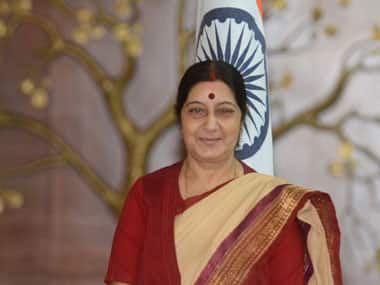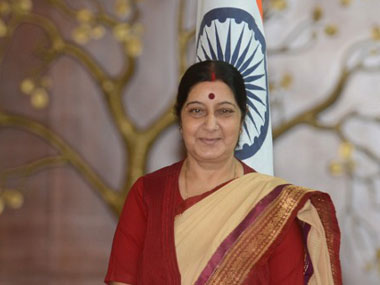Politicians often say something when they are in opposition and just the opposite when they become ministers. Sushma Swaraj is no exception to this unwritten, unspoken norm in Indian politics. Just last winter she said “Nyet” to the then Bangladeshi foreign minister Dipu Moni who visited New Delhi primarily to enlist BJP’s support on the issue of Land Boundary Agreement (LBA) between India and Bangladesh in the run up to general elections in Bangladesh. It was a dominant issue for Bangladeshi politics as well as in Sheikh Hasina’s scheme of things, but India failed to oblige its old and trusted friend. Hasina had sent her foreign minister to make a last ditch effort to woo the BJP. Swaraj, then Leader of Opposition in the Lok Sabha, told her that the BJP continued to oppose the LBA. Now cut to 26 June, 2014 when as External Affairs Minister she told her Bangladeshi counterpart Abul Hassan Mahmood Ali that the upper house of Indian parliament – Rajya Sabha – is actively considering the LBA issue and assured that the deal would be signed soon, Ali said at a briefing in Dhaka after his delegation-level talks with Swaraj. On another contentious pending issue of Teesta river water treaty, the Bangladeshi foreign minister remarked thus: “The Indian side informed us that they are having internal consultation to reach a consensus.” (Helpfully for India, Ali also assured Swaraj that Bangladesh would not allow anyone to run terrorist activists against India or any country in the world using its territory.) This is politics for you! Thus, Swaraj, who made a conscious decision (in consultation with the PMO, of course) to make Bangladesh as the destination of her first stand-alone bilateral visit (25-27 June), made all the right noises in her new avatar as the External Affairs Minister. She emphasized on “commonalities” of the past (“We shed blood together”) and of the future (“Our destinies are linked”). She also stressed on “commonalities” about the present, saying that Bangladesh is unequivocal and uncompromising in its opposition to terrorism in any form and manifestation and it will never allow its territory to be used against India. Thursday was the main operative day for official engagements of Swaraj who flew into Dhaka on late Wednesday night as she concluded her delegation-level talks with her Bangladeshi counterpart and also called on Prime Minister Sheikh Hasina. On Friday she is scheduled to meet opposition leader and chief of Bangladesh Nationalist Party Begum Khaleda Zia, the other major pole of the bipolar Bangladeshi polity. In her talks with the Bangladeshi leaders, Swaraj put a laser beam focus on connectivity of four types: in terms of people, energy, transport linkages and exchange of ideas. Ministry of External Affairs spokesperson Syed Akbaruddin, who is accompanying the minister in Dhaka, gave details to this writer through an email message about India’s stand and proposals on these four types of connectivity. First of all, the MEA spokesperson categorically stated that there is no proposal for “visa free” travel for Bangladeshi nationals to India. He amplified the point further by saying that the issue of “Visa on Arrival” is something that the Indian home ministry is working on. “There is still some distance to cover before decisions on when, how and who from which countries will be covered by this policy. Obviously when we consider these issues in their entirety the issue of what will be the dispensation for Bangladeshi Nationals will certainly figure in the entire calculus,” he said. Swaraj extended a sort of confidence building mechanism on behalf of the ruling BJP (a party that has traditionally gone hammer and tongs on the issue of illegal immigrants from Bangladesh) by conveying to Dhaka the Indian government’s decision that Bangladeshi nationals below 13 and above 65 years of age will be eligible for 5 year multiple entry visas as against the current practice of multiple entry for one year. On energy connectivity, Swaraj assured the leadership of Bangladesh that in addition to the 500 MW power already being supplied across the Behrampore-Bheramara grid connection, India is prepared to supply 100 MW of power from the Palatana project. On connectivity of transport linkages, Swaraj confirmed India’s willingness to increase the frequency of the Maitree Express and the number of AC coaches, provided Bangladesh is agreeable. She recalled the Dhaka- Kolkata bus service which was started in 1999 and proposed that India and Bangladesh work on a possible Dhaka-Shillong-Guwahati Bus service On the connectivity of ideas, Swaraj provided the futuristic design of the proposed Bangladesh Bhaban at Shantiniketan which is one more step in terms of establishing connectivity in terms of ideas among the young and talented of the two countries. Moreover, Bangladesh has agreed to participate in the Nalanda University. In conclusion, one can say that Swaraj’s first bilateral foreign visit to Bangladesh is more in the mould of diplomatic symbolism and conveying to Dhaka the high degree of importance the new government in India attaches to Bangladesh, the country with which India shares its longest border (over 4100 kms). [caption id=“attachment_1588383” align=“alignleft” width=“380”]  Sushma Swaraj. AFP image[/caption] No agreements were signed after her official talks with her Bangladeshi interlocutors. But then no agreement was meant to be signed in the first place. Yet, it was a substantive visit as it helped establishing a re-connect between the two countries at the foreign ministers’ level. To use cricket terminology, Swaraj’s visit was just a warm up friendly match to prepare the two sides for the real test match to start soon. The two sides have pending crucial issues like LBA and Teesta treaty and they will do well to remove these irritants soonest possible. One may see concrete deliverables on these fronts later this year when Sheikh Hasina is likely to visit India on invitation of Prime Minister Narendra Modi. The writer is a Firstpost columnist and a strategic analyst who tweets @Kishkindha.
To use cricket terminology, Sushma’s Bangladesh visit was just a warm up friendly match to prepare the two sides for the real test match to start soon.
Advertisement
End of Article
Written by Rajeev Sharma
Consulting Editor, Firstpost. Strategic analyst. Political commentator. Twitter handle @Kishkindha. see more


)

)
)
)
)
)
)
)
)



